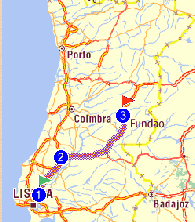|
PART 1 T O P I C |
|
|
|
|
|
|
|
|
|
|
|
|
|
|
|
|
|
|
JewishWikipedia.info
GROWTH
According to Wikipedia Wikipedia
The history of Fundão is intimately related to that of its originally Jewish, then New-Christian or Marrano population.
While documents from 1307 referred to 32 houses the bulk of the population only settled after the 1492 Expulsion of the Jews from Spain. Close to the border, and home to significant Jewish minorities the Cova da Beira region received many refugees. Many came to Fundão, whose population swelled to that of a city transforming it into an important commercial and industrial centre. The creation of the Portuguese Inquisition saw many Jews and New-Christians arrested, tortured, executed &/or had their possessions expropriated. The commercial dynamism of the city was affected.
Maria Antonieta Garcia, who is a retired professor of Sociology at the the University of Beira Interior where she founded the Centre for Jewish Studies, records in ‘Inquisição e Independência, Um Motim No Fundao-1580’ (Inquisition and Independence, A Riot in Fundão-1580) the only known public act of resistance against the Inquisition in Portugal which occurred in Fundão on November 22, 1580.
Damião Mendes, a bailiff of the unHoly Office of the Inquisition reported that he was received at the door of a church by Estêvão Sampaio, the senior alderman in the town, and armed men who meant to kill him. He said they confronted him with the intention of impeding the work of the unHoly Office of the Inquisition. Bailiff Mendes complained of being pushed and knocked down, that the armed men broke his rod and took away his sword, that he was left without his hat and cape, and that he fell to the ground. They cut loose his horses and roughed up one of his men. He alleged that Sampaio spoke harshly to him and was rude, that he told him that he would take his rod and, lhe meteria pelo cu acima, and other such vulgar words.
As was customary in that period, the bailiff would have arrived in Fundão secretly, then made an announcement to the population to attend church on Sunday in honour of some saint. When the church was full, the doors would be locked by guards and the Old Christians would be called upon to identify the New Christians who would be handcuffed and led away to the subterranean jail cells of the unHoly Office, except this time, the secret was discovered and the bailiff was in for a surprise.
In July, Fundão, the town where the riot occurred, Estêvão de Sampaio, captain, was the eldest alderman. New Christians struggled against the Inquisition, and everyone, New Christians, and Old Christians, opposed the claim of jurisdiction by neighbouring Covilha and Guarda.
The place was proclaimed a city in 1580, by its notables after declaring support for the attempt by Dom António, Prior do Crato, to preserve Portuguese independence against the ambitions of the King of Spain Felipe II (Felipe I of Portugal). The Municipal Council and autonomy were granted in 1747.
In the late 18th century the Prime-Minister of Portugal, the Marquis of Pombal, abolished the legal restraints on the New Christians so they had the same rights as the Old Christians. He tried to recreate the strength of Fundão by founding the Royal Factories (today the City Hall). This generated the revival of the wool industries and cloth was again exported to northern Europe. The city decayed again after its sack by the Napoleonic French invasions of Portugal and the following Civil War.
Today, it is an important local centre.
FUNDÃO and the JEWS -
Rebellion Against the Inquisition
SUMMARY
______________________________

In 1492, after they were expelled from Spain, most Jews settled near the border. Fundão was an important commercial and industrial centre. Later, the Portuguese Inquisition arrived and many were tortured, executed and/or had their possessions seized.
November 22, 1580 saw the only known public resistance against the Inquisition.
In the late 18th century the Prime-Minister of Portugal, the Marquis of Pombal, abolished the legal restraints on New Christians when compared to Old-Christians.
The wool industry became depressed after being sacked during the (defeated) Napoleonic French invasion of Portugal and the subsequent civil war.
Today, it is an important industrial and service center.
|
CLICK BUTTON TO GO TO SECTION |
THE
INCREDIBLE
STORY OF THE JEWISH PEOPLE

